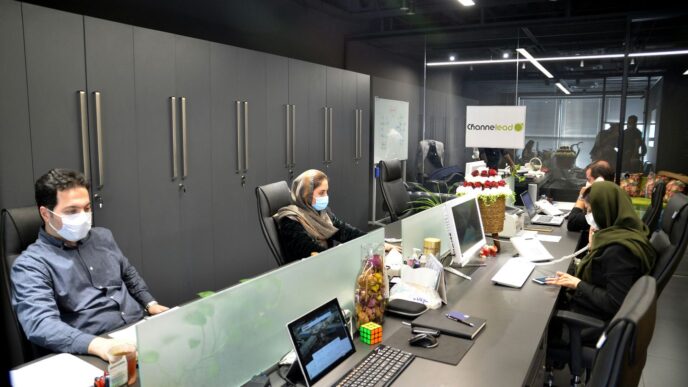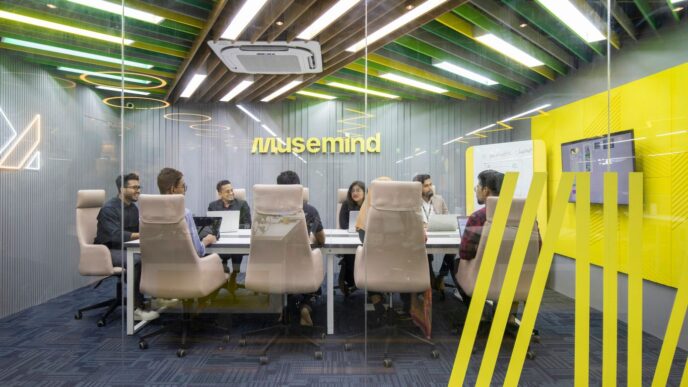Thinking about moving up in your company? It’s a great feeling to get that promotion you’ve been working towards. But before you get there, you’ll likely have an interview. These aren’t like outside interviews, because you already know everyone. You need to show you’re ready for more, and that you can handle new tasks and maybe even lead people you used to work side-by-side with. Let’s talk about how to get ready for those specific interview questions internal promotion processes often bring up.
Key Takeaways
- Understand that internal promotion interviews focus on your existing company knowledge and relationships, but also on your ability to take on new responsibilities and lead.
- Prepare for questions that assess your past contributions, how you handle team challenges, and your leadership style, as these are common interview questions internal promotion processes evaluate.
- Showcase your readiness by highlighting specific achievements, clearly explaining your vision for the team, and demonstrating your people skills.
- Anticipate scenarios like leading former peers and making tough calls, and think about how your colleagues see your leadership.
- Use tools like AI for mock interviews and resume help to get ready, and remember to follow up professionally after the interview.
Understanding The Internal Promotion Interview Landscape
So, you’re thinking about moving up within the company. That’s great! But an internal promotion interview isn’t quite like applying for a job somewhere new. You already know the people, the systems, and probably a lot of the challenges. This familiarity is a double-edged sword, though. You need to show you can handle more, but you also have to manage existing relationships and not upset the apple cart too much.
Navigating Existing Relationships and New Responsibilities
This is where things get a bit tricky. You’ve likely worked with your potential new boss and maybe even some of your future team members for a while. You need to demonstrate that you can step into a leadership role without alienating your former colleagues. It’s about showing you can be a leader, not just a buddy. Think about how you’ll address your current peers if you get the job. Will you be able to give them feedback or make tough decisions that might affect them? It’s a delicate balance, and interviewers will be looking for signs you can handle it. You’ve got to show you understand the company’s social media presence and how to communicate effectively, both internally and externally.
The Importance of Demonstrating Team Cohesion
When you move into a new role, especially one with leadership responsibilities, your ability to keep the team working well together is key. Interviewers want to know you can step up and guide the group, not just do the work yourself. They’ll be asking questions to see if you can maintain or even improve how the team functions. Think about times you’ve helped resolve conflicts or encouraged collaboration. These are the kinds of things that show you understand how to build a strong team.
Leveraging Existing Company Knowledge
One of the biggest advantages you have as an internal candidate is your existing knowledge. You know the company culture, the unwritten rules, and where the bodies are buried (figuratively speaking, of course!). Use this to your advantage. When asked about challenges or future plans, you can draw on specific examples and insights that an external candidate wouldn’t have. This shows you’re not just qualified on paper, but you’re also a good fit for the company’s specific environment. It means you can hit the ground running, which is a huge plus for any hiring manager.
Key Interview Questions For Internal Advancement

So, you’ve put in the time, you know the company inside and out, and you’re ready for that next step. That’s great! But the interview process for an internal promotion isn’t quite the same as an external one. They already know your work history, but they need to see if you’re ready for more. It’s about showing you can handle new challenges and lead in a different capacity. Let’s look at some questions that might come up.
Assessing Past Contributions and Future Vision
Interviewers want to know what you’ve done that makes you a good fit for this new role. It’s not just about listing projects; it’s about explaining the impact. Think about specific times you went above and beyond or solved a tricky problem. Be ready to connect your past successes directly to the requirements of the new position. They also want to hear about where you see yourself and the team going. What are your ideas for improvement? What new initiatives could you bring to the table?
- Describe a time you exceeded expectations in your current role. What was the outcome?
- What do you see as the biggest opportunities for this department in the next year?
- How have your previous projects prepared you for the responsibilities of this role?
Addressing Team Challenges and Strategies
Every team has its hurdles, and your potential new manager wants to know if you can identify them and, more importantly, if you have a plan to tackle them. This shows you’re not just looking for a title, but you’re invested in the team’s success. Think about common issues like communication breakdowns, workflow inefficiencies, or low morale. What steps would you take to address these?
| Challenge Area | Proposed Strategy |
|---|---|
| Communication | Implement weekly team syncs and a shared project board |
| Workflow Efficiency | Analyze current processes for bottlenecks |
| Team Morale | Organize cross-functional team-building activities |
Demonstrating Leadership Style and Decision-Making
This is where you show how you lead. Are you a hands-on leader, or do you prefer to empower your team? How do you handle making tough calls, especially when not everyone will agree? It’s important to show you can be decisive but also considerate of your team’s input. Think about how you’ve handled disagreements or difficult feedback in the past. Your ability to make sound judgments, even under pressure, is key. You can find some great examples of how to answer these types of questions by looking at internal promotion interview questions.
- How do you motivate a team when facing tight deadlines?
- Describe a situation where you had to make an unpopular decision. How did you handle it?
- What is your approach to conflict resolution within a team?
Showcasing Your Readiness For A New Role
So, you’ve made it to the interview stage for that internal promotion. That’s great! Now, the big question is, how do you actually show them you’re ready for it? It’s not enough to just say you can do the job; you need to prove it with your actions and your vision. This is your chance to really shine and demonstrate that you’re not just looking for a title change, but that you’re prepared to step up and make a real impact.
Highlighting Relevant Accomplishments
When they ask about your past work, don’t just list your duties. Think about specific times you went above and beyond or solved a tricky problem. Use the STAR method – Situation, Task, Action, Result – to tell a short story. Numbers really help here. For instance, instead of saying "I improved efficiency," try "I implemented a new process that cut down our report generation time by 20%, saving about 5 hours per week."
Here’s a way to structure your examples:
- Situation: Briefly describe the context. What was the problem or opportunity?
- Task: What was your specific responsibility or goal?
- Action: What steps did you take? Be detailed about your contributions.
- Result: What was the outcome? Quantify it if possible.
Articulating Your Vision for the Team
They want to know you’re not just thinking about yourself. How will you help the team you’ll be leading? Talk about specific ideas you have for improving processes, boosting morale, or achieving team goals. Show that you’ve thought about the challenges and opportunities ahead.
For example, you could say:
- "I’ve noticed our team could benefit from more cross-training. I plan to set up a system where team members can share their specialized knowledge, which I believe will make us more adaptable."
- "My goal is to create a more collaborative environment. I’m thinking about implementing weekly check-ins focused not just on tasks, but on sharing successes and roadblocks."
- "I want to ensure everyone feels their contributions are recognized. I’m considering a peer-to-peer recognition program to highlight great work."
Demonstrating Emotional Intelligence
This is about how you handle yourself and interact with others. Can you manage your own emotions and understand the emotions of those around you? Think about times you’ve had to deal with difficult colleagues, manage stress, or adapt to change. Showing you can handle these situations with grace and professionalism is key.
Consider these points:
- Self-Awareness: Acknowledge areas where you’ve grown. For instance, "I used to get frustrated when projects changed direction unexpectedly, but I’ve learned to see it as an opportunity to adapt and find new solutions."
- Empathy: Show you understand others’ perspectives. "I know that change can be unsettling for a team, so I plan to communicate openly and listen to concerns during any transition."
- Relationship Management: Talk about how you build and maintain positive working relationships. "I make an effort to understand my colleagues’ working styles and preferences, which helps us collaborate more effectively."
Preparing For Common Internal Promotion Scenarios
So, you’ve put your hat in the ring for that internal promotion. That’s awesome! But now comes the part where you actually have to prove you’re the right person for the job, and it’s not always as straightforward as it seems. You already know the company, you know the people, but that can actually make things a bit trickier.
Handling Questions About Leading Former Peers
This is a big one. Interviewers often want to know how you’ll handle being in charge of people you used to be on the same level with. It’s about showing you can be a leader without alienating your old buddies. You need to demonstrate that you can set boundaries while still being approachable. Think about how you’ll manage performance reviews, delegate tasks, and handle disagreements fairly. It’s a delicate balance, for sure.
Here’s a way to think about it:
- Acknowledge the shift: Recognize that the dynamic will change, and that’s okay.
- Focus on fairness: Explain how you’ll treat everyone equitably, regardless of your past relationship.
- Emphasize shared goals: Talk about how you’ll work together to achieve team objectives.
- Maintain professionalism: Show you understand the importance of professional conduct.
Strategies for Difficult Decision-Making
Promotions often come with tougher choices. You might have to decide on resource allocation, project priorities, or even personnel matters. Interviewers will want to see your thought process. They’re not just looking for the answer, but how you get there. Think about a time you had to make a tough call. What information did you gather? Who did you consult? What was the outcome?
Consider this framework for explaining your decision-making:
- Problem Identification: Clearly state the issue you faced.
- Information Gathering: Detail the data and insights you collected.
- Option Evaluation: List the different paths you considered and why.
- Consultation: Mention if and who you spoke with for advice.
- Decision & Rationale: Explain your final choice and the reasoning behind it.
- Outcome & Learning: Discuss the results and what you learned from the experience.
How Colleagues Perceive Your Leadership
This is where your reputation within the company really comes into play. Interviewers might ask how your colleagues see you, or they might have their own opinions. It’s good to have a sense of how you’re viewed. Are you seen as someone who collaborates well? Do people trust your judgment? Being able to talk about your team’s strengths and how you contribute to a positive work environment is key. If you’ve had to manage conflict or difficult personalities, be ready to discuss that constructively. It shows you can handle the tough stuff.
Leveraging AI For Interview Preparation
So, you’re looking to move up within the company. That’s great! But let’s be real, internal interviews can feel a bit tricky. You know everyone, but now you have to prove you’re ready for more. This is where technology can really lend a hand. Artificial intelligence tools are becoming super helpful for getting ready.
Utilizing Mock Interviews For Practice
One of the best ways to get comfortable is by practicing. AI can set up mock interviews that feel pretty realistic. You can get questions tailored to the job you want, and the AI can even give you feedback on your answers. It’s like having a coach available anytime. This kind of practice helps you get your thoughts organized and speak more clearly. It’s a big step up from just reading through potential questions. You can find tools that offer personalized feedback based on your resume and the job description, which is a real game-changer for refining your skills.
Enhancing Your Resume With AI Tools
Your resume is your first impression, right? AI can help make sure it’s as strong as possible. These tools can look at your resume and suggest ways to make it better, like adding the right keywords that hiring managers or applicant tracking systems look for. They can also help with formatting, making sure it looks professional and easy to read. Getting your resume just right can make a big difference in getting that interview in the first place. Some platforms even help you build a resume from scratch, focusing on action verbs and clear descriptions of your accomplishments.
Gathering Typical Questions and Response Advice
AI can also help you figure out what kinds of questions you’re likely to face. Based on the role and your company, these tools can generate lists of common questions, including those specific to internal promotions. You can then use these lists to prepare your answers, thinking about your past contributions and how you’d handle new responsibilities. It’s not just about knowing the questions, but also about having solid responses ready. Some resources even offer advice on how to structure your answers, making sure you cover all the important points. For instance, you might get advice on how to talk about your vision for the team or how you’d manage former peers if you get the promotion. This kind of targeted preparation can really boost your confidence and your chances of success.
Post-Interview Strategies For Internal Candidates
So, you’ve gone through the interview process for that internal promotion. That’s a big step! Now what? It’s not over just because you walked out of the room. Think of it like finishing a race; you still need to cool down and stretch.
First off, sending a thank-you note is a must. It doesn’t have to be a novel, just a quick email to the people who interviewed you. Mention something specific you talked about to show you were really listening. It’s a small gesture, but it can make a difference. You want to express your continued interest in the role, and maybe reiterate why you’re a good fit. It’s a chance to make a good impression one last time.
Here’s a quick rundown of what to do:
- Send a personalized thank-you email: Within 24 hours, reach out to each interviewer. Reference a specific point from your conversation.
- Follow up if necessary: If they gave you a timeline for hearing back and that time passes, a polite follow-up call or email is okay. It shows you’re still keen.
- Keep relationships strong: Regardless of the outcome, stay professional with your colleagues and the hiring manager. You’re still part of the same company, after all. Maintaining good connections is important for future opportunities.
It’s also smart to keep developing your skills. Think about what you discussed in the interview. Were there areas you could brush up on? Continuing your professional development shows commitment. It’s not just about this one role; it’s about your career path within the company. You might even want to use tools to practice common questions or get feedback on your resume, which can help you prepare for future internal moves. Remember, your performance and how you handle yourself after the interview matter. It’s all part of presenting yourself as a capable and thoughtful candidate for any future role.
Wrapping Up Your Promotion Push
So, you’ve prepped, you’ve practiced, and you’ve thought about how to talk about your wins and your plans. It’s a lot, I know. But remember, getting that promotion isn’t just about knowing the answers; it’s about showing you’re ready for the next level. Think about what makes you a good fit, not just for the job, but for the team too. And don’t forget to send that thank-you note – it’s a small thing, but it can make a difference. Keep learning, keep showing up, and you’ll be well on your way to landing that new role. It’s definitely a process, but with a solid plan, you can make it happen.
Frequently Asked Questions
What’s different about an interview for a promotion inside my company compared to a regular job interview?
Interviews for promotions inside your company are a bit different because you already know the people and how things work. You need to show you can do more, handle new tasks, and still get along with everyone. It’s about showing you’ve grown and are ready for more responsibility while keeping good teamwork.
How should I talk about my past work when I’m going for a promotion?
When talking about what you’ve done, focus on the things that show you’re ready for the new job. Pick examples where you solved problems, helped your team, or did a great job. Explain what you did and what good results came from it. It’s like telling a story about your successes that lead you to this next step.
What if I get promoted and have to lead people I used to work with as an equal?
This can be tricky, but it’s important to be fair and respectful. You need to show you can lead by being clear about your decisions and why you made them. Listen to your team’s ideas and concerns. Your goal is to be a good leader while still being a good teammate, building trust through open talks and support.
How can I show I’m ready for more responsibility?
Show you’re ready by talking about times you took on extra tasks, learned new skills, or helped solve big problems. Mention any training you’ve done or how you’ve improved processes. It’s also good to share your ideas for how you’d make things even better in the new role.
Are there tools that can help me get ready for this kind of interview?
Yes, absolutely! You can use computer programs that help you practice. They can ask you questions like a real interviewer and even give you tips on how you’re doing. You can also use them to make your resume look better and highlight your best achievements for the new job.
What should I do after the interview is over?
After the interview, send a thank-you note or email to the people who interviewed you. Mention something specific you talked about to show you were paying attention. Keep being a good team member and keep learning new things. This shows you’re serious about your career and the company.














